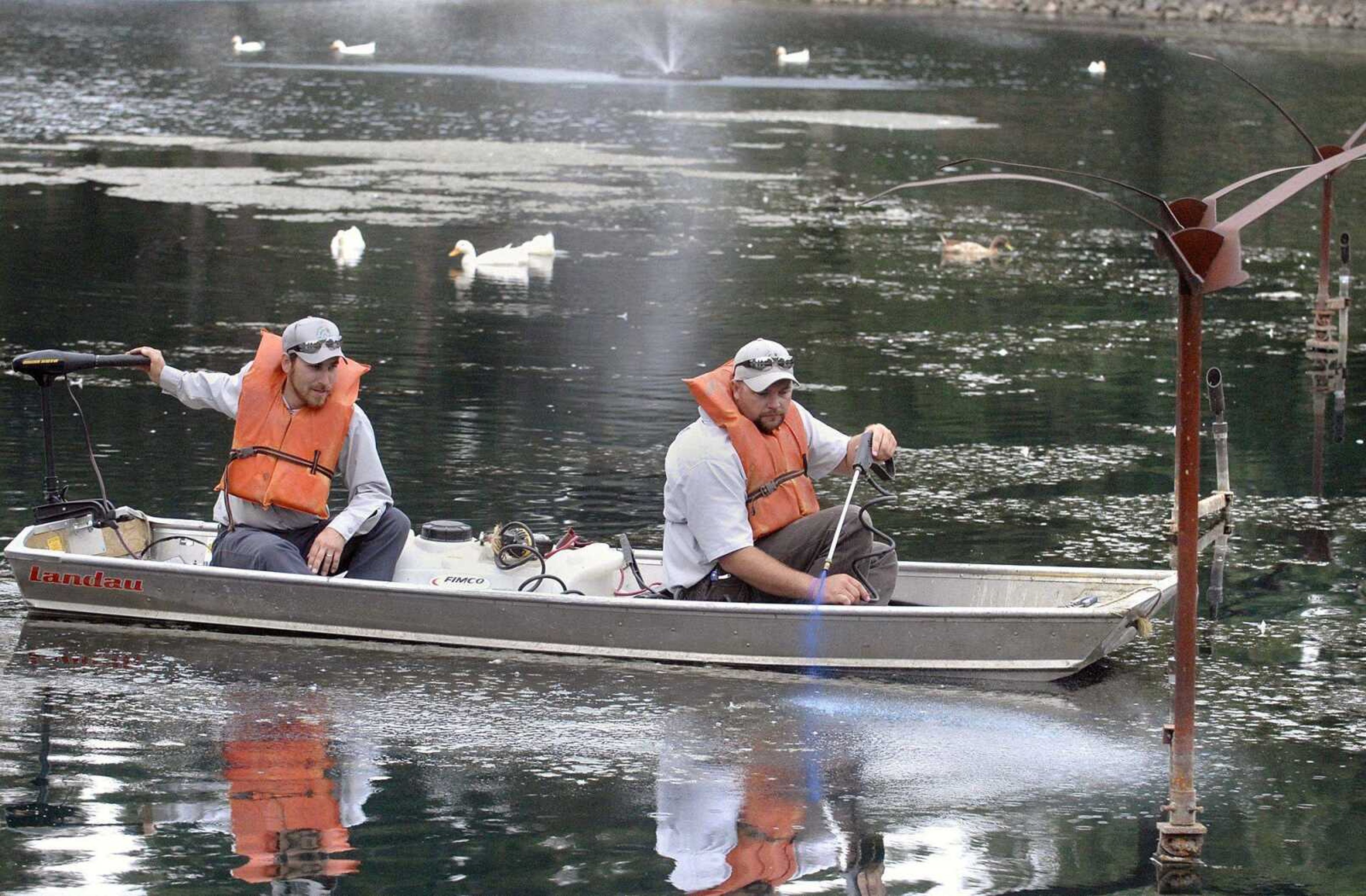Cape looking to solve Capaha Park lagoon's algae abundance
The mushy green clumps floating in Capaha Park's lagoon Wednesday morning didn't stop Brenda Morse from walking its perimeter. But the Scott City resident agreed that the excessive amounts of algae have certainly distracted from the normally scenic setting...
The mushy green clumps floating in Capaha Park's lagoon Wednesday morning didn't stop Brenda Morse from walking its perimeter.
But the Scott City resident agreed that the excessive amounts of algae have certainly distracted from the normally scenic setting.
"It really takes away from it," Morse said. "It's just awful looking."
The occasional sight of algae skimming its surface is no doubt as old as the lagoon itself. The 3.5-acre lagoon was put in a year or so after the property was transformed into a fairgrounds in 1900 and has remained through the decades since the city acquired it in 1914.
But Cape Girardeau parks officials say the problem has grown over the years, resulting in the worst-ever year for algae.
"This has been the worst summer by far," parks division manager Brock Davis said. "That stuff just kept growing. It was growing just as fast as we could get in there and get it out."
The department has fought it with everything it could think of, from dumping in 100 algae-eating carp to manually removing it with a makeshift scoop using the mouth of a backhoe.
On Wednesday, two city maintenance workers hopped in a johnboat armed with about two gallons of algicide to kill existing algae and guard against future infestation. One of the workers, Derek DeSpain, said they have treated the lagoon 15 to 20 times this year and that he hoped the cooler temperatures would make Wednesday the last one. The chemicals, he added, aren't strong enough to hurt the ducks.
By today, the algae should be brown and dying and completely gone from the surface within three to four days, DeSpain said.
That's the way it's gone all summer. The algae surfaces in vast quantities, they treat it and it returns a week or so later. Several culprits can be blamed on the increased algae amounts, Davis said -- the summer's excessive heat, a growing number of visiting geese that bring different species of algae and a shallower pool of water.
The algae has contributed to the situation, as well, clogging up the aeration system meant to keep the problem at bay. Not to mention that duck and goose excrement also create favorable growing conditions for algae, Davis said.
Perhaps the biggest contributing factor, however, is the fact that the lagoon is only about half as deep as it used to be, Davis said. At its deepest, the lagoon today is about 5 feet, while years ago it was 10 to 12 feet, he said.
The diminished depth is being brought about by silting, which happens to a lot of older ponds, Davis said. The pond serves as a stormwater drain, with rain -- and muck -- being dumped into the pond from the north and south ends.
The lagoon hasn't been dredged in about 20 years, Brock said, to remove some of the silt. It needs to be, he said, but an estimate five years ago showed it would cost $100,000.
"So that's our problem," Davis said. "Algae tends to grow in warmer, shallow water. If we could dredge it out and make it deeper, that would help a lot of issues. Not that we'd ever be able to remove it 100 percent, but it would be a lot better."
City officials said they are working on addressing the problem. Mayor Harry Rediger said he is aware of the situation and one plan being considered for the short term is to come up with the money to dredge the lagoon.
But a more permanent answer could come from the parks department's creation of a strategic plan for the entirety of Capaha Park.
"Another idea is to change the concept of the lake a bit," Rediger said. "I can't report on it yet, because it's still in the planning stages. But we do intend to fix that in some manner -- it's just that how it's to be fixed is yet to be determined."
The parks advisory board, he said, is working on the Capaha Park plan to figure out how best to recreate the park since the removal of the park's pool earlier this year.
The department is taking a look at solutions to address the pond's poor water quality, said parks director Julia Thompson. Dredging is on the list of possibilities, she said, as well as new filtration systems.
But the pond does need an overhaul, she said. The department is about to ask for proposals from park design firms to help draw up concepts for a new master plan. Such a plan likely won't be ready until the middle of next year, she said.
But any changes to the park would include the lagoon, she said.
"It's a major feature and a major attractor to park users," Thompson said. "We want to make sure we do what needs to be done to ensure the overall long-term health of the lagoon."
smoyers@semissourian.com
388-3642
Pertinent address:
Capaha Park, Cape Girardeau, MO
Connect with the Southeast Missourian Newsroom:
For corrections to this story or other insights for the editor, click here. To submit a letter to the editor, click here. To learn about the Southeast Missourian’s AI Policy, click here.










